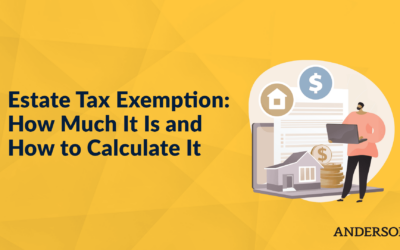In light of the COVID-19 pandemic, many are thinking about estate planning and how to prepare for the unexpected. Learn the basics of what you need and what can wait.
Updated September 29, 2021
Over the past few weeks, I’ve received a lot of calls from concerned clients regarding estate planning. Estate planning is one of those things that a lot of people put on “Someday Island,” thinking they’ll get to it eventually. The coronavirus, on the other hand, has caused people to think about their estate plans more thoroughly. So, over the last couple of weeks, I’ve compiled the questions I’ve received and put it all together in one place.
One of the things I want to point out right off the bat is that estate planning is not just about our eventual passing. When we talk about estate planning, we’re talking about “if anything happens” — this includes while we’re living, such as the possibility of incapacitation. It may not be the most comfortable topic, but it’s important to know how to navigate the obstacles created by coronavirus/COVID-19 to create an estate plan that preserves your estate and wishes during times of crisis.
Reasons for Estate Planning Procrastination
Estate planning is not just about eventual death — it’s very much about what happens while you’re alive, as well. One of the most important documents I’m going to cover is the healthcare power of attorney. If you become incapacitated, you need these documents in place beforehand to dictate your level of care and make things easier for you and your heirs. These important legal documents must be in place before the need arises — when the need arises, it’s usually too late to do anything.
One of the most common reasons I see for estate planning procrastination is thinking there’s plenty of time. The thing is, there isn’t plenty of time. Again, these documents take time to draft and must be in place before something happens. And none of us know when something will happen.
Other reasons I see for estate planning procrastination include the simple fact that it’s not an easy or comfortable topic to think about, the process is “too complicated,” “too intimidating,” or “too expensive.” Despite these reasons, estate planning actually doesn’t have to be a complicated or intimidating process. And the costs have come down considerably in the last decade or two.
What Is an Estate? Perception vs. Reality
I used to think that an estate plan is only for the mega-rich — those with MBAs, or “massive bank accounts.” This couldn’t be further from the truth. In reality, an estate plan includes your home, your car, any collectibles you may have, and family heirlooms. If you invest in real estate or own real estate assets, those are included as well. An estate plan also includes any life insurance policies you may have, retirement account assets, and business interests.
Estate Planning Options
Estate planning is important because it allows you to select trusted individuals to manage your money and property after your passing, as well as to make decisions on your behalf when you can’t while you’re still living. Furthermore, estate planning allows you to decide the loved ones you want to receive your money and property after you’re gone.
Without a clear estate plan, the state decides for you. This is called “probate.” Many don’t know this, but probate is actually a voluntary process. So, what does probate entail?
Probate
Probate is an expensive, lengthy process. On average, probate takes anywhere from 18-24 months from start to finish. This longevity is part of why probate is expensive. The length of time is due in part to the state wanting to lock up your assets to ensure that your creditors are paid. To do that, you have to have attorneys, who aren’t cheap. Ultimately, probate is a process designed to protect creditors, not your family and assets.
Probate is a matter of public record. This means that, if you choose to go through probate, your private matters become public record. This makes it easy to contest the allocation of assets in the probate process. What I often see with probate is, since it’s public, creditors start coming out of the woodwork. Many creditors actually research the probate files actively.
With probate, the court decides who receives your assets, not you. Your family will wait months before receiving anything — sometimes years. And what they do receive will be significantly less after the probate process due to its high cost. Moreover, if you own real estate in more than one state, you’ll have to go through the probate process in each individual state. This can take years.
No Plan (Intestate)
If you pass without a plan in place, that’s called “dying intestate” — which results in your estate going through probate. This means you won’t be able to control guardianship for your children or the distribution of your assets. Beyond that, if your spouse remarries, there’s the possibility that your children will be disinherited from your estate without a clear plan.
Joint Tenancy with Right of Survivorship
Joint tenancy with right of survivorship means that each person is entitled to the whole. If one owner of property dies (say, a spouse), the surviving owner becomes the full owner of the property. This avoids probate, but still has downsides. Joint tenancy with right of survivorship does not allow for control of guardianship of your children or protect your children from the possibility of being disinherited.
Will
A will is a document designed to transfer ownership of property upon death. It designates beneficiaries and an executor or executrix for the estate. Wills are the most common estate planning tools because they can be remarkably inexpensive to set up. If you drive through town, you may see billboards advertising $99 wills. The thing is: wills are cheap for a reason. They’re actually a loss leader for attorneys. Attorneys will sell wills at a loss knowing they’ll make that money back during probate.
Unfortunately, most folks don’t realize that a will is not the ideal estate plan. Wills do not allow for control of guardianship for your children or protect your children from the possibility of being disinherited. While wills do provide limited control of the distribution of assets upon your passing, they go through probate. Thus, the court is really the true deciding factor on how your assets are distributed after your passing when you use a will. As I mentioned earlier, probate is incredibly expensive to the estate and can last years.
Living Trust
The only estate planning vehicle that avoids all of these pitfalls is a living trust. With living trusts, you transfer your assets into the ownership of the trust while you’re still living. Thus, the trust owns the assets, not you. If and when you pass, it doesn’t matter — the trust already owns the assets. You determine how the assets should be distributed.
As the trustee, you retain control of the assets while you’re living. It’s called a living trust for a reason — while you’re living, you can change the trust any time, as often as you like. That’s because living trusts are revocable trusts.
Living trusts allow you the greatest control of your estate after your passing. Furthermore, you can plan for other possibilities within your trust, including incapacitation, controlled distributions, and more.
Must-have Documents
These are the documents you should have in place right now to prepare for any outcome. The must-have documents include:
- Pour-over will
- Durable financial power of attorney
- Durable medical power of attorney
- Physician directive
- Declaration of guardian
- Schedule of gifts
- Final instructions
Let’s break these documents down in more detail.
Pour-Over Will
During your lifetime, you may acquire assets that you forget to deed into your living trust. A pour-over will is designed to capture those assets within your trust even if you forgot to move them to your trust. The pour-over will is a catch-all to ensure that anything not inside the trust will be put inside the trust.
Powers of Attorney
There are two types of durable powers of attorney: financial and medical. The person who you appoint financial durable power of attorney takes care of your finances and pays bills on your behalf if you become incapacitated. The person who you designate medical durable power of attorney makes medical decisions on your behalf if you become incapacitated. This includes directing your level of care.
Guardianship Provisions
The state doesn’t know your family. Guardianship provisions within a living trust leave the power of deciding who will care for your children in your hands, not the state’s. This also prevents family members from fighting over guardianship.
Schedule of Gifts
The schedule of gifts outlines who you would like to receive what possessions. This can include family heirlooms, collectibles, or items of sentimental value. The schedule of gifts is also known as the personal property memorandum.
Final Instructions
These are also known as memorial instructions. These include your specific wishes for your memorial, including funeral directions and burial versus cremation preferences.
Putting It All Together
Overall, it’s crucial that everyone think about estate planning now, before anything happens. That’s why I’ve put together a comprehensive package to make putting everything together as simple and easy as possible. This estate planning package includes everything we just went over (and more):
- Living trust
- Pour-over will
- Durable financial power of attorney
- Durable medical power of attorney
- Physician directive
- Declaration of guardian
- Schedule of gifts
- Final instructions
Considering the times we’re living in, I wanted this to be priced well, too, so that it’s accessible to anyone who needs it. Click here to learn more about our estate planning bundle.
If you’d like to discuss your estate planning options with an experienced and understanding professional, schedule your complimentary Strategy Session today. You can schedule online or by calling 888.871.8535.
Bonus Video
Protect Your Legacy for Your Family
Schedule your free, 45-minute estate planning strategy session and learn how to ensure your family avoids probate and receives your assets and property.














